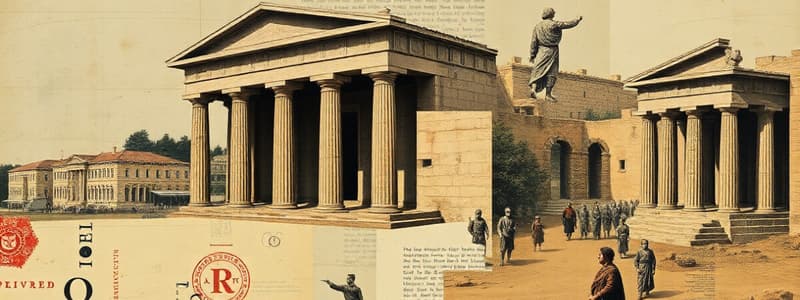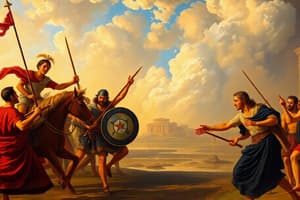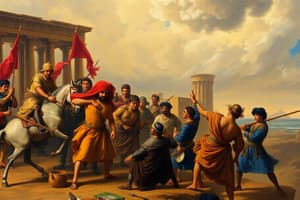Podcast
Questions and Answers
Which Athenian statesman played a pivotal role in the Greek naval victory at Salamis?
Which Athenian statesman played a pivotal role in the Greek naval victory at Salamis?
- Pericles
- Miltiades
- Leonidas
- Themistocles (correct)
The Persian Wars primarily weakened the Athenian Empire.
The Persian Wars primarily weakened the Athenian Empire.
False (B)
What was one key impact of the Persian Wars on Greek society?
What was one key impact of the Persian Wars on Greek society?
The Persian Wars fostered a strong sense of patriotism and civic pride within the Greek city-states, particularly Athens.
The Persian Wars were significant for the development of Greek ______ strategies, particularly in naval warfare.
The Persian Wars were significant for the development of Greek ______ strategies, particularly in naval warfare.
Match the following Greek figures with their respective roles in the Persian Wars:
Match the following Greek figures with their respective roles in the Persian Wars:
What was the primary reason for the conflict between the Persian Empire and Greek city-states?
What was the primary reason for the conflict between the Persian Empire and Greek city-states?
The Ionian Revolt was a major turning point in the Persian Wars, ultimately leading to the expulsion of the Persians from Greece.
The Ionian Revolt was a major turning point in the Persian Wars, ultimately leading to the expulsion of the Persians from Greece.
What was the name of the battle that saw a decisive Greek victory against the Persian army, halting their initial advance on Athens?
What was the name of the battle that saw a decisive Greek victory against the Persian army, halting their initial advance on Athens?
The Battle of _____, a heroic but unsuccessful stand by Spartan forces, slowed down the Persian advance during the Second Persian Invasion.
The Battle of _____, a heroic but unsuccessful stand by Spartan forces, slowed down the Persian advance during the Second Persian Invasion.
Which of the following was NOT a key figure in the Persian Wars?
Which of the following was NOT a key figure in the Persian Wars?
Match the battle with its significant outcome:
Match the battle with its significant outcome:
The Persian Wars were a series of conflicts that only involved military battles, with no cultural or political implications.
The Persian Wars were a series of conflicts that only involved military battles, with no cultural or political implications.
What is the name of the geographical region where the Greek city-states that revolted against Persian rule were located?
What is the name of the geographical region where the Greek city-states that revolted against Persian rule were located?
Flashcards
Miltiades
Miltiades
Athenian general crucial in the Battle of Marathon.
Leonidas
Leonidas
Spartan King commanding at the Battle of Thermopylae.
Themistocles
Themistocles
Athenian strategist vital in the naval victory at Salamis.
Impact of Persian Wars
Impact of Persian Wars
Signup and view all the flashcards
Weakening of Persian Empire
Weakening of Persian Empire
Signup and view all the flashcards
Persian Wars
Persian Wars
Signup and view all the flashcards
Ionian Revolt
Ionian Revolt
Signup and view all the flashcards
First Persian Invasion
First Persian Invasion
Signup and view all the flashcards
Battle of Marathon
Battle of Marathon
Signup and view all the flashcards
Xerxes I
Xerxes I
Signup and view all the flashcards
Battle of Thermopylae
Battle of Thermopylae
Signup and view all the flashcards
Battle of Salamis
Battle of Salamis
Signup and view all the flashcards
Battle of Plataea
Battle of Plataea
Signup and view all the flashcards
Study Notes
Overview of the Persian Wars
- The Persian Wars were a series of conflicts between the Achaemenid Empire of Persia and various Greek city-states.
- The period spanned from 499 to 449 BCE.
- These conflicts were pivotal in ancient Greek history, shaping the region's political landscape and influencing the development of Greek culture and civilization.
- The causes of the wars were complex and multifaceted.
Key Factors Leading to the Persian Wars
- Persian expansionism threatened the independence of Greek city-states.
- The growth of the Persian Empire under rulers like Cyrus the Great and Darius I posed a significant threat.
- Greek settlements in Asia Minor clashed with Persian control.
- Athenian intervention and growing naval power made them a key target and participant.
- The Ionian Revolt directly triggered initial Persian invasions.
Major Conflicts and Battles
- Ionian Revolt (499-494 BCE): Greek cities in Asia Minor, including Athens and Eretria, rebelled against Persian rule. However Spartan involvement was limited. The revolt was suppressed.
- First Persian Invasion (492 BCE): Darius I invaded Greece with a large naval and land force. A significant portion of the Persian fleet was destroyed by a storm.
- Second Persian Invasion (490 BCE): Darius I sent another expedition to punish Athens and Eretria, culminating in the Battle of Marathon. The Greeks decisively won.
- Second Persian Invasion continued (480-479 BCE): Xerxes I, Darius's successor, led a larger invasion. Key battles included Thermopylae, where Spartan forces made a heroic stand, and Salamis, where the Athenian navy defeated the Persian navy. The decisive Battle of Plataea ended the Persian threat in Greece.
Key Figures
- Darius I: Persian king who initiated the initial invasions.
- Xerxes I: Darius's successor, leading the larger invasion.
- Miltiades: Athenian general crucial to the Battle of Marathon.
- Leonidas: Spartan king and commander at Thermopylae.
- Themistocles: Athenian statesman and strategist, critical to the naval victory at Salamis.
Impact and Significance of the Persian Wars
- Defense of Greek freedom: The wars solidified Greek identity and their independence from Persian rule.
- Athenian ascendance: The Greek victory allowed Athens to become a dominant power in the Delian League and a major naval force.
- Cultural exchange and conflict: The wars exposed Greeks to Persian culture; Persian forces interacted with Greeks.
- Development of military tactics: The battles influenced Greek strategies, particularly naval warfare.
Long-term consequences
- Weakening of Persian Empire: The Persian Wars significantly strained the Persian Empire's resources and manpower.
- Rise of Greek democracy and civic pride: The wars instilled a strong sense of patriotism and civic pride in Greek city-states, particularly Athens.
- Foundation of Greek civilization: Greek society progressed through conflicts and collaborations during this period.
- Emphasis on individual excellence: Greek heroes from the Persian Wars became iconic symbols of bravery and determination.
Legacy of the Persian Wars
- The Persian Wars left a lasting impact on Greek culture.
- Battles and individuals remain significant historically and culturally.
- These conflicts showcase the Greeks' resilience and determination against a powerful empire.
Studying That Suits You
Use AI to generate personalized quizzes and flashcards to suit your learning preferences.




